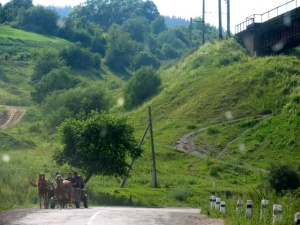In a recent NY Times article (http://tiny.cc/FsiSk) I read of a neuroscientist who realized that despite her Ph.D. she really wanted to chuck her academic career and become a horse trainer.  Amongst other factors in the article, she noted her naivete about thinking that one advances in academia based on merit, which crashed into her real-life experience that revealed how much it all had to do with politics.
Amongst other factors in the article, she noted her naivete about thinking that one advances in academia based on merit, which crashed into her real-life experience that revealed how much it all had to do with politics.
Despite her being a brain expert, the article stayed away from what I imagined would be the hook: why a neuroscientist would have the edge when training horses because they could whisper ever more effectively to them. And I was glad, in the end, that the story wasn’t about that, or about her now being a super-star horse trainer.
Instead, this article fits in with several of the ideas I feel are central to parenting, and living our lives, in the clearer understanding that these are privileges we share. And if sharing them with people who are phony starts to get us down, perhaps we can get in touch with our inner Holden Caulfield and, despite our pangs of isolation when we tread our own path, share our lives with the spirits that still ring true in animals… and in children. The neuroscientist-turned-horse-trainer is a story about following one’s true heart. The article notes that her parents are both dead (perhaps a factor in her rethinking what matters, and what lasts), and that her grandfather, who used to brag about his granddaughter at Johns Hopkins, is now silent about her work. This taps into a challenge we face as parents: we might intellectually agree that kids should be gardeners or garbage collectors if they want, so long as they are happy; but do we really believe this when it comes to our own kids?
I was intrigued by this woman, Michelle Nihei, finding a way to connect with her inner and best Self in the world of horses—arguably a symbol of the powerful and unconscious forces of our primal nature. When such a “smart” person chooses to go back to a more earthy way of existence, she becomes a champion of new metrics of success. If it weren’t for our massive levels of judgment, I think a lot of people might find greater happiness and self-esteem doing things like carpentry and other “crafts” rather than the “professions” that are at once held in regard, but also in suspicious contempt, by our insecure and idealizing/devaluing culture.
We need new questions to guide and gauge “success,” such as: “are we authentic, kind and attuned with our world?”; or, “are our homes sustainable rather than vast, and are we happy vs. miserable in them?”; and, “does our world need more investment bankers, and are Harvard and Stanford true emblems of assured success and well-being, or do we need more gifted and caring elementary school teachers, and shouldn’t they be able to buy a home and educate their children rather than feel they will be ‘losers’ in the eyes of not just society, but of their own over-achieving parents?”
Personally, I’m both fascinated by, and slightly scared of, horses. I know that my grandfather, who died within weeks of my birth, never said much to my dad about his life in Russia before he fled. The one fact I carry was that he was so good with horses that, despite his being a Jew, the Russian Army hired him to train horses. My dad also joked that his dad might have been a horse thief… I do know also that Joseph was one of the first people to ever receive Electro Shock Therapy in Chicago, where despite working his way up from pushing a fruit cart on the streets to owning a business, he suffered from that black Russian depression that is like an ongoing November in the soul. And I know that although he could not drive, be bought a car and would sit in it and listen to the radio. The story about Michelle, the horse trainer, made me think of Joseph, and of all of our relationships with our ancestors in general. And it made me wonder if my grandfather had needed to be around horses again.
Finally, the subject of race horses also reminded me of my father-in-law, who loved the track—where he would seem to bet on every horse at the same time. He rarely won, but there was something so kind and life-affirming about rooting for all of them. This, I believe, is the way we must parent our kids, getting beyond the mind-set of winners and losers and cheering like mad, and betting heavily, on every single one of them.
Namaste, Bruce



{ 1 comment… read it below or add one }
Excellently written!!!! This rings true to me and very helpful.